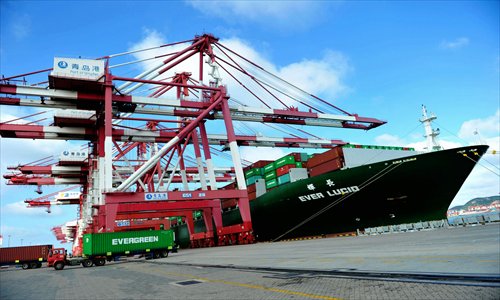China will face more trade remedy measures
The country should be aggressive in countering disputes: experts

A cargo ship at a port in Qingdao, East China's Shandong Province, on July 8 Photo: IC
Although recent trade disputes may not necessarily signal a rise in protectionism, China should be more proactive while also enhancing its skills in trade law, experts warned on Thursday.
On Wednesday (US time), the US Department of Commerce said it would charge duties on washing machines built in China by Samsung Electronics Co and LG Electronics Inc, according to an announcement on the Ministry of Commerce (MOFCOM) website on Thursday morning.
This was the latest in a number of anti-dumping probes launched by the US, after challenging China's export duties on raw materials on July 13. Meanwhile, the EU launched a third legal challenge to restrictions on Chinese exports of 11 key metals and minerals, seeking formal consultations at the WTO, Reuters reported Tuesday.
China, one of the world's largest trade partners, has been targeted by Western countries for years in trade dispute cases, noted He Weiwen, an executive council member at the China Society for WTO Studies. "But now things are getting worse due to the sluggish global economic growth, and some governments are striving to protect their own industries first," he told the Global Times Thursday.
In the first six months of 2016, China has encountered 65 trade remedy measures adopted by 17 countries and regions around the world, up about 67 percent year-on-year, Shen Danyang, spokesman of the MOFCOM, said at a press conference on Tuesday.
The total trade cost involved in those measures is $8.5 billion, up 156 percent year-on-year, he noted. And among the countries that launched investigations, the US and India were the two most active, with 18 and 15 cases, respectively. "It could be seen as a full rise in protectionism," Shen said at the conference.
European countries and the US are using anti-dumping and anti-subsidies measures as "excuses" to counterbalance China, which now exports both low- and high-end products, igniting competition with their own industries, Bai Ming, research fellow at the Chinese Academy of International Trade and Economic Cooperation, told the Global Times on Thursday. Moreover, the escalating trade disputes are partially due to the debate over China's market economy status (MES), according to Bai.
Since 2001, the year China joined the WTO, protocol has stated that a member country can launch an anti-dumping investigation against China, and can use a method not based on a strict comparison with domestic prices or costs in China if the producer under investigation cannot prove that market economy conditions prevail in the industry.
However, this method will no longer be effective as of December 11, according to the document.
"There will be uncertainties in trade dispute settlements after that date," Bai said, noting that the most important point in this issue is the methodology of comparing Chinese export prices with third party prices or costs will not be able to be used in few months.
Sang Baichuan, director of the institute of international business at the University of International Business and Economics in Beijing, echoed Bai's point of view. "It seems like Western countries are trying to grab the last opportunities in using the methodology before it expires," he told the Global Times on Thursday.
Experts said that more trade remedy measures will come up in the second half of 2016, and feel that China has to take more active measures to counter the disputes.
To fight back
Global trade is no longer growing, and governments will be more tempted to "steal" market share by resorting to beggar-thy-neighbor policies, which data from 2015 to the present bears out, a report issued by independent academic think tank Global Trade Alert stated on Wednesday.
In terms of the number of imposing discriminatory measures, resorts to protectionism were higher in 2015 than in 2009, with the US and Russia topping the list of the most protectionist nations in 2015, the report showed.
Since the beginning of this year, a large number of anti-dumping and anti-subsidies probes came from the steel industry, which is facing overcapacity issues not only domestically but also globally, He noted. "Terms which arouse anti-dumping sentiment, such as 'relocating excessive production overseas', should be avoided," he said.
Still, the most effective way is to become more proactive in trade disputes, experts said. "Instead of only 'responding to investigations', China could fight back like it did in 2009 during tire export disputes," Bai said.
Also, Chinese lawyers should further enhance their skills in dealing with trade disputes, Sang noted. "They need to be more rigorous and leave little ambiguity for their foreign counterparts," he said.